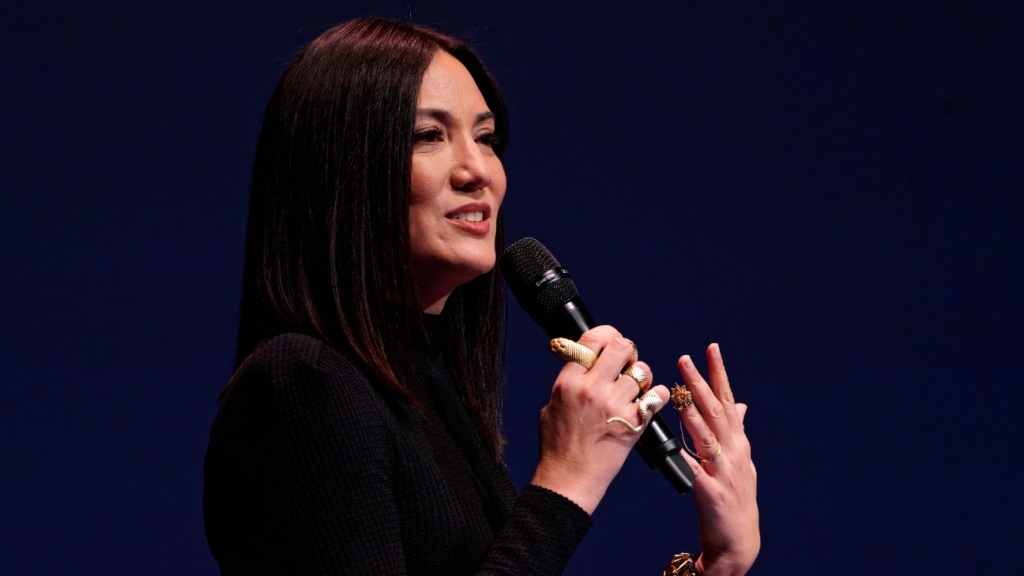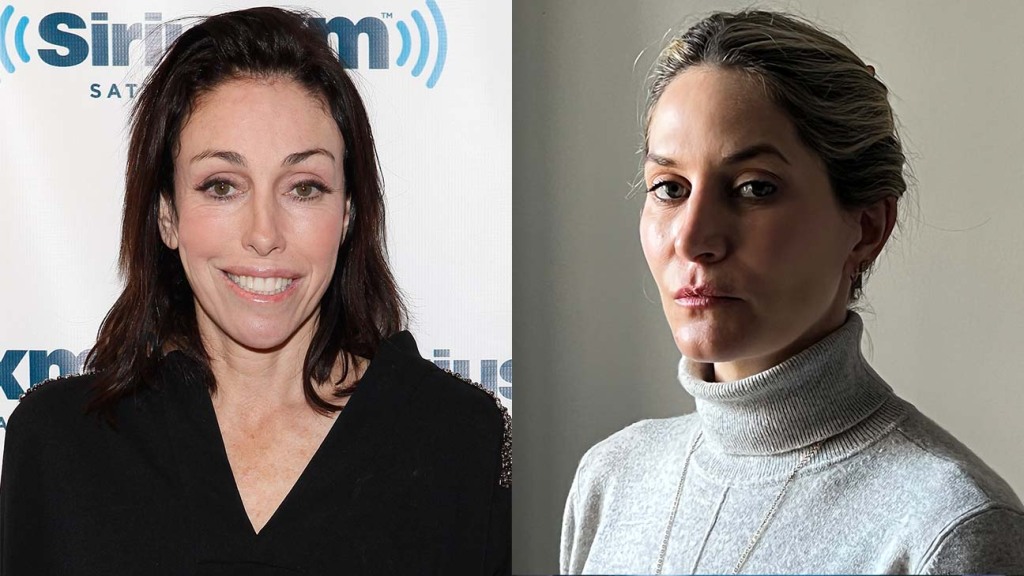When Sienna Miller arrived on the set of for the first day of filming in October 2021, a Native American shaman came to bless the grounds. There were no printed signs directing her where to go, or stacks of paper scripts available for producers to scribble their notes in the margins. Instead, there were clothing racks filled with thrifted and vintage garments sustainably sourced by the costume department, water stations for refilling nonplastic bottles, compostable plates and utensils, and plant-based craft services. It was the greenest set the actress says she’s ever been on.
“It was really environmentally conscious, and that was a treat,” says Miller. “I’ve been on sets with bamboo stools, but nothing to the degree that this was.”
That difference was intentional on the part of Scott Z. Burns, writer, director and creator of the new Apple TV+ series, and executive producers Dorothy Fortenberry and Media Res’ Michael Ellenberg.
“Dorothy and I, along with Media Res and Apple, felt that if we were going to make this show, we needed to try and make it in the way that the subject matter required of us,” says Burns.
All filming took place throughout New York City’s five boroughs, drastically reducing the project’s carbon footprint. But the greatest success of the production, which employed the help of Green Spark Group, a consulting firm that trains filmmakers on how to reduce their environmental impact during production, was simply demonstrating what’s possible when it comes to how we engage with the Earth and with each another.
Which is precisely the point of Extrapolations. Rather than fixate on hypotheticals about what the planet might be like if humans continue on our current path or depict a distant, apocalyptic-like universe, the eight-episode drama drops viewers in near-future societies around the world where its characters’ entire relationship to one another revolves around the climate issues many believe we still have the luxury to ignore. And that, in and of itself, is terrifying, says Yara Shahidi, another member of the star-studded cast.
“I think that this series asks a question in a really helpful way, which is, As much as you may think of it as an extreme imagining of the future, is it really all that extreme? Is it really all that unrealistic?”
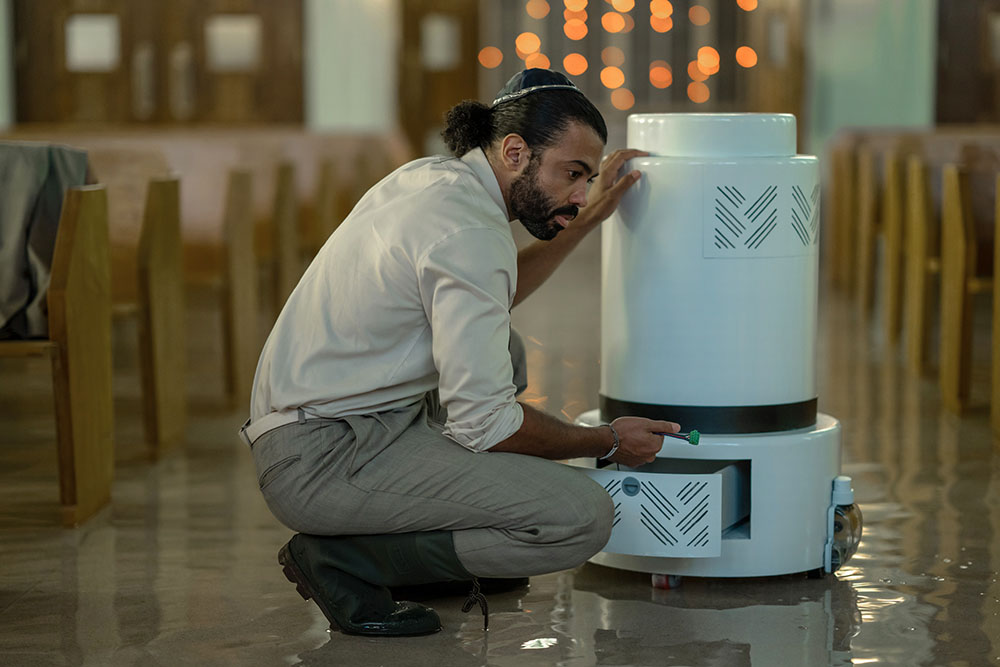
Courtesy of Apple TV+
Extrapolations begins in the year 2037 with climate activists protesting Alpha Industries, a tech company that claims economies will fail if corporations such as theirs aren’t allowed to develop technologies that will raise average temperatures more than 1.5°C above pre-industrial levels — which scientists say is the cutoff to avoid climate catastrophe — in the short term in order to remedy ecological issues in the long term. The argument sets the stage for the theme of environment versus enterprise that plays out in the series.
Kit Harington plays Alpha CEO Nicholas Bilton. “He’s obviously shaped around a few different people in our consciousness right now,” says Harington. “You could pick any one of those kinds of tech billionaires and decide that’s who he’s based on. But really, he’s his own invention. It’s this idea of someone who is ultra-capitalist and very motivated by the free market and believes that they can save the world through capitalism and all of the issues that come with it.”
It’s also during this episode that audiences are introduced to two of the characters who’ll humanize the threat of environmental calamity: newly appointed youth Rabbi Marshall Zucker (Daveed Diggs) and marine biologist Rebecca Shearer (Miller).
“The fame of the cast was important because we wanted characters and actors that the audience would immediately connect to and feel for,” says Ellenberg. “We wanted to collapse the distance from this issue, and with these famous actors you’re there automatically.”
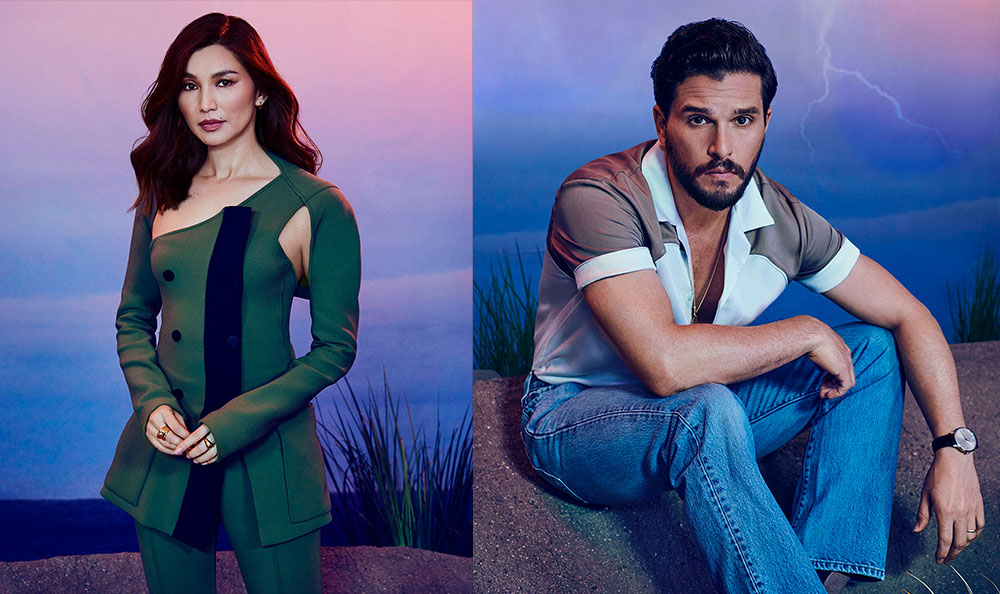
Photographed by Jai Lennard
Episode two, “Whale Fall,” set in 2046, finds Shearer in Cali, Colombia, working as a species archivist for a company called Menagerie 2100. She’s developed a relationship with Eve, the last humpback whale on earth, who’s on a forlorn quest to find a mate after losing all four of her children. She shares this desire with Shearer, who’s able to communicate with Eve by assigning her the voice of her late mother, played by Meryl Streep.
“It was extraordinary to watch her work because she can be having a laugh one minute and then suddenly, she gives the greatest emotional performance you’ve ever seen take place and it’s so grounded in truth,” Miller says of Streep. “Because she’s so open and available, it just inspires something in return.”
The thread of parenthood and loss is personal to Burns, whose passion for saving humpback whales dates back to the second grade when he first helped raise money for the cause.
“I think the fact that my father was dying while I was writing that episode made me think a lot about my childhood and about saying goodbye and the idea of, What would it be like to do an exit interview with the last whale?” he says. “What would they say about us?”
In the midst of her grief, Shearer’s also managing 9-year-old son Ezra’s “summer heart,” an illness that requires him to limit his time outdoors. It’s one of several presently fictitious, yet futuristically plausible conditions brought on by global warming — along with “heat rage” and even earlier onset dementia — that shows up in the series.

Courtesy of Apple TV+
“We talked to different scientists and experts about potential realities,” explains Fortenberry. “We asked, ‘How will climate change affect agriculture? How will it affect real estate? How will it affect cities? How will it affect politics?’ What we were able to do was come up with potential worlds that really unfolded in ways that surprised us.”
One such world is that of adult Ezra (Tahar Rahim), now living in London in the year 2066, which is explored in episode six, titled “Lola.” Facing cognitive decline, having outlived his summer heart diagnosis, Ezra relies on a technology known as “Cache Cloud” to keep his most precious memories alive. However, when the cost of the service increases after an earthquake causes the servers to crash, he’s forced to make difficult decisions about which moments to preserve.
It’s through his work with a personnel application known as Pack that he meets Natasha (Gemma Chan), a single mother who uses the platform to provide a father figure for her daughter after her biological dad disappears. Using technology and his command of multiple languages, Ezra is able to assume the appearance of different individuals whom he’s hired to impersonate for various purposes, from human connection to confessing wrongdoings. With most clients, the job is merely a task to check off his daily to-do list, but he finds himself forming a bond with Natasha.

Courtesy of Apple TV+
“They’re grieving, they’ve both lost their respective loves of their lives, they’re yearning for connection. and, really, against the odds, they’re falling for each other,” says Chan. “I found it really interesting, this idea that in society at that time, everything will have become so divided and fragmented that we’re connecting in this kind of way.”
There’s a desperation that comes over Ezra, however, when no amount of money or technology proves sufficient to keep his memories safe, with Cache Cloud servers continuing to overheat as temperatures soar to 2.32°C above pre-industrial levels. Ultimately, he’s forced to assess what he’s sacrificing to cling to a life that’s no longer his.
“One of the themes of the episode is about letting go and being in the present and that conflict that we all have — whether we’re looking too much into the future or still trapped by the past — of, How can we be completely present and focused on now?” adds Chan. “I think that’s relevant to your romantic life, but also every area of your life.”
Beyond depicting how climate change could upend individual lives on an intimate level, the series also zooms out to the larger, geopolitical landscape. Ecocide — widespread, long-term and severe destruction of the natural environment that’s brought on by either deliberate or negligent human action — is a concept that originated in the 1970s following the Vietnam War. While 10 nations have domestic laws criminalizing ecocide, only one of which — France — is a Western country, there’s currently no international law that bans the practice in peacetime. In Extrapolations, world leaders can no longer afford to overlook how the devastation brought on by increasing global temperatures affects countries in disparate ways.
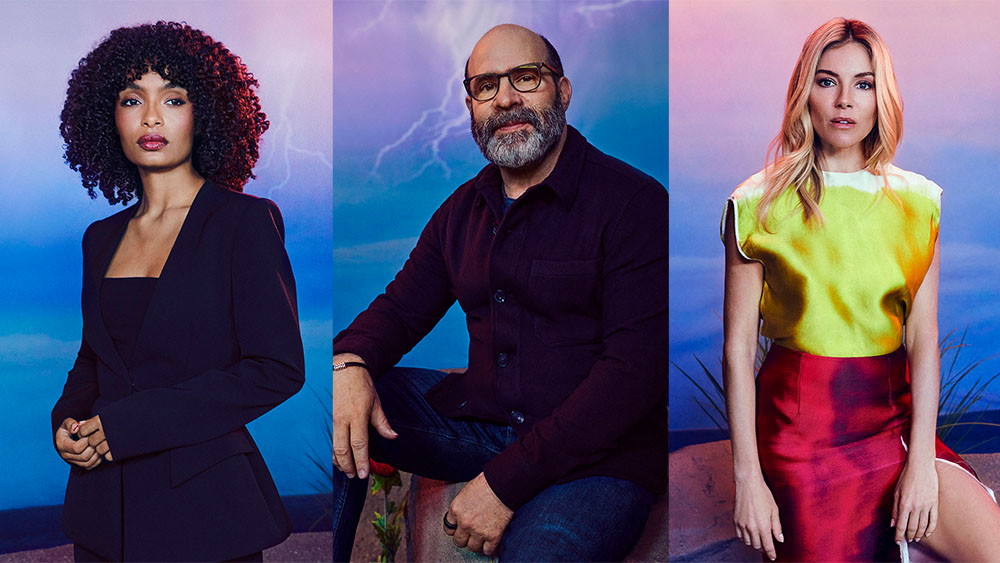
Photographed by Jai Lennard
In episode one, representatives from Algeria and Palestine make pleas to France for access to water, which they argue will also slow the increase in refugee migration. In episode five, set in Mumbai in the year 2059, a nationwide drought resulting from extreme temperatures has rendered stolen goods from the Svalbard Global Seed Vault in the Arctic useless. The predicament calls into question whether the illegal practice of geoengineering, foreshadowed in the prior episode, would be justified if it could bring back the rain needed to germinate the unmarked seeds, even if it played into the hands of controversial billionaire inventor Gita Mishra (Indira Varma).
All the while, Alpha Industries continues to develop technologies that Bilton argues satisfy the basic human desire for convenience.
“So as far as he’s concerned, he’s trying to do right by everyone,” Harington explains. “He thinks his company is the company to help the emerging climate crisis. The trouble is that, like with anyone who spends their life at the top of a company such as that, things get distorted in his mind and money enters in an unhealthy way into his motivation.”
It’s that acknowledged propensity to place comfort above climate concerns that gives audiences an opportunity to take a look at their own choices. (In one scene, a government official confesses, “I feel like I traded the future for the present.”) It’ll be an international court, however, and not individuals’ own consciences, that will decide the cost of doing so.
“If God made humans in his image, why do they suck? Or did we just evolve into sucking?” a precocious preteen (Neska Rose) asks Rabbi Zucker as they stand in the middle of a synagogue in Miami, wearing rain boots due to the persistent sea level rise in episode three, “The Fifth Question.”
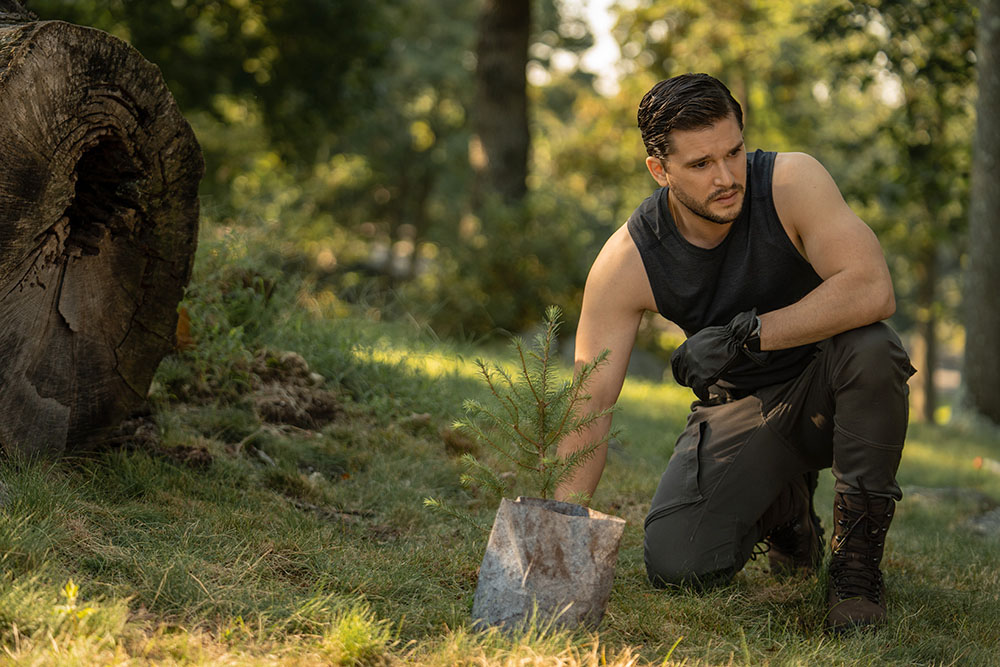
Courtesy of Apple TV+
“I wanted to write something that was broadly about what we do in society when the stories and the myths that we tell each other at home or in church or in synagogue begin to fray at the edges. Because the world that exists in those stories is also fraying at the edges,” explains Burns.
The episode, which stars Diggs and David Schwimmer as two practicing Jewish men with conflicting agendas for the climate-displaced, is inspired by the Coen brothers’ 2009 black comedy A Serious Man and is one of several ways Burns plays with various genres throughout the series. Episode four, “Face of God,” starring Edward Norton, which Burns co-wrote with novelist Dave Eggers, draws from Sidney Lumet’s 1964 Cold War thriller Fail Safe, written by Walter Bernstein. Burns likens episode seven, which he crafted with playwright Bess Wohl, to Edward Albee’s 1966 play, Who’s Afraid of Virginia Woolf?
“I remember saying to Michael and Dorothy, ‘You should be able to take a story as fundamental as Romeo and Juliet and ask, so how does that change in a climate-changed world?’ — because all the stories that we know were written for a climate that no longer exists.”
In the penultimate episode, “The Going Away Party,” set in San Francisco in 2068, Sylvie (Marion Cotillard) invites Nic (Tobey Maguire) and his much younger girlfriend, Elodie (Eiza González), over for a New Year’s Eve feast with her husband, Auggie (Forest Whitaker), that costs them six carbon credits. It’s more than they can afford, which is why Sylvie, in her floor-length formal gown, tells Anna, the help she’s hired for the night — who has to wear an oxygen mask as she treks through the street to make it to the couple’s walk-up apartment — not to expect a tip.

Photographed by Jai Lennard
During dinner, Auggie reveals he’s won a lottery that allows members of society’s upper echelon to upload themselves into a digitized cloud to be awakened at a later date when the world is in a happier and healthier state. He shares his desire to take advantage of the opportunity without first consulting his wife — an indicator of the state of their marriage. What follows is a meltdown on the part of Sylvie that’s so impetuous you can’t help but laugh as it unfolds onscreen.
“That’s her strength,” González says of Nicole Holofcener, who directed the episode. “She really understands how to bring out the comedy and absurdity of certain situations.”
Still, there’s an equal level of realism in uncovering how interpersonal relationships will be affected by individual responses to the new way of living brought on by climate change.
“What I loved about the episode is it allowed for deep conversations on-set,” adds González. “Marion comes from a completely different culture growing up in France, and me in Mexico, and with Forest and Tobey there’s all of these different years, times and places in the world, and we had to figure out, How does that intertwine? These conversations really bled into our lives on a daily basis.”
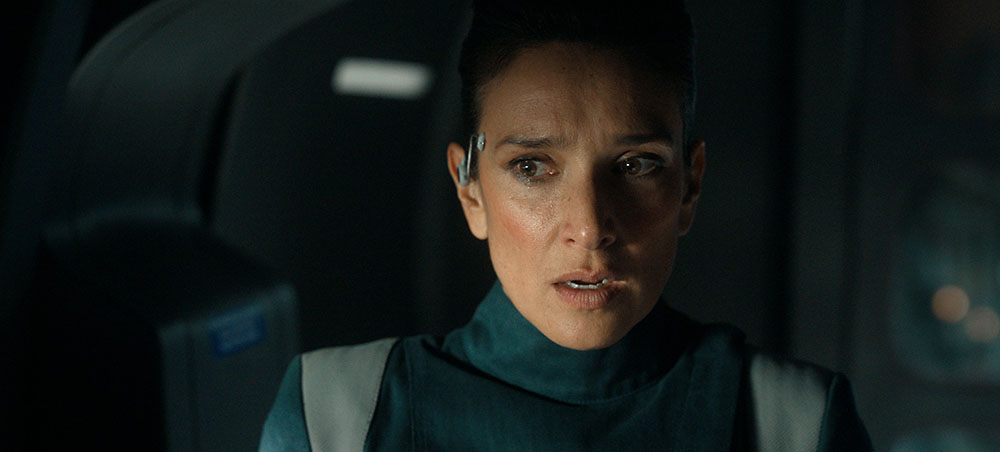
Courtesy of Apple TV+
The final episode of season one of Extrapolations opens with a scene of Grammy Award-winning Blues musician Ben Harper singing a pared-down version of Marvin Gaye’s “Mercy Mercy Me (The Ecology)” onstage. The year is 2070, the average global temperature has increased by 2.59°C, and the reality predicted in the song’s 1971 lyrics have been fully actualized.
Where did all the blue skies go?
Poison is the wind that blows
“It’s important that people learn that Marvin Gaye’s ‘Mercy Mercy Me’ is kind of the first song that brought awareness to this issue,” says Burns. “Once you understand that, you begin to learn that this issue shows up in people’s lives in different ways, and it’s not surprising that frontline communities often experience this in ways that aren’t on the weather report.”
Burns’ words speak to the personalization of environmental issues that defines Extrapolations and underlines its effectiveness. The hope, says Chan, is that “people are moved, entertained and perhaps a little bit scared” after watching the series.

Courtesy of Apple TV+
The creators also want viewers to be galvanized to act. “When I describe the series, people are like, ‘OK, so do we fix it or don’t we?’ ‘Do we win or do we lose?’ And that’s not the question,” says Fortenberry. “It’s not a binary. It’s an ongoing, unfolding event that we’re all going to be living through, and we’re all going to be influencing, and there will be challenges and opportunities at every turn.”
In fact, many of them are already here.
“My daughter watched the trailer and said, ‘The reality is, this is not far away,’ adds Miller. “It’s probably a decade too late that we’re making this show, but how wonderful that there’s a platform to tell it.”
The Making of Star-Studded Climate Drama ‘Extrapolations’: “I Hope People Are Moved, Entertained and Perhaps a Little Bit Scared”

